Volume 4, Issue 3 (2019)
Manage Strat Health Syst 2019, 4(3): 219-229 |
Back to browse issues page
Download citation:
BibTeX | RIS | EndNote | Medlars | ProCite | Reference Manager | RefWorks
Send citation to:



BibTeX | RIS | EndNote | Medlars | ProCite | Reference Manager | RefWorks
Send citation to:
Rostami V, Bastani P, Kavosi Z, Ravangard R. Knowledge Translation Status in Shiraz University of Medical Sciences. Manage Strat Health Syst 2019; 4 (3) :219-229
URL: http://mshsj.ssu.ac.ir/article-1-263-en.html
URL: http://mshsj.ssu.ac.ir/article-1-263-en.html
1- Ph.D. student of Health Services Management, Student Research Committee, School of Management and Medical Informatics,Shiraz University of Medical Sciences, Shiraz, Iran
2- Associate Professor, Health Human Resources Research Center, Department of Health Services Management, School of Management and Medical Informatics, Shiraz University of Medical Sciences, Shiraz, Iran
2- Associate Professor, Health Human Resources Research Center, Department of Health Services Management, School of Management and Medical Informatics, Shiraz University of Medical Sciences, Shiraz, Iran
Abstract: (3356 Views)
Background: The optimal use of research findings is crucial. One of the activities that improves application of research-derived knowledge is the knowledge translation. This study aimed to investigate the status of knowledge translation in Shiraz University of Medical Sciences.
Methods: This cross-sectional and descriptive-analytical study was conducted in 2018. The sample size included 143 faculty members of Shiraz University of Medical Sciences selected using the stratified sampling and simple random sampling methods. The required data were collected using a standard knowledge translation questionnaire consisting of 50 items in 4 dimensions. The validity and reliability of the questionnaires were confirmed in the previous studies. The collected data were analyzed using SPSS 21 by descriptive and analytical statistics.
Results: The results showed that overall status of the knowledge translation was weak (2.46 ± 0.67). In this regard, producing useful evidence for decision making (2.77 ± 0.77) and promoting application of evidence (2.33 ± 0.88) had the highest and lowest mean scores, respectively. Furthermore, the overall mean of knowledge translation was significantly different with gender, type of center, and scientific rank (P < 0.05).
Conclusion: Given the undesirable and weak status of knowledge translation, creating a culture of knowledge translation, training about knowledge transfer and utilization of research findings, creating incentive mechanisms, developing transparent processes and guidelines, and strengthening the interaction between knowledge producers and research users are essential.
Methods: This cross-sectional and descriptive-analytical study was conducted in 2018. The sample size included 143 faculty members of Shiraz University of Medical Sciences selected using the stratified sampling and simple random sampling methods. The required data were collected using a standard knowledge translation questionnaire consisting of 50 items in 4 dimensions. The validity and reliability of the questionnaires were confirmed in the previous studies. The collected data were analyzed using SPSS 21 by descriptive and analytical statistics.
Results: The results showed that overall status of the knowledge translation was weak (2.46 ± 0.67). In this regard, producing useful evidence for decision making (2.77 ± 0.77) and promoting application of evidence (2.33 ± 0.88) had the highest and lowest mean scores, respectively. Furthermore, the overall mean of knowledge translation was significantly different with gender, type of center, and scientific rank (P < 0.05).
Conclusion: Given the undesirable and weak status of knowledge translation, creating a culture of knowledge translation, training about knowledge transfer and utilization of research findings, creating incentive mechanisms, developing transparent processes and guidelines, and strengthening the interaction between knowledge producers and research users are essential.
| Rights and permissions | |
 |
This work is licensed under a Creative Commons Attribution-NonCommercial 4.0 International License. |








